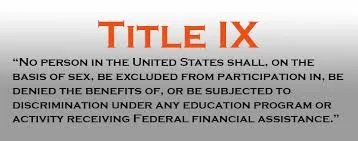If your institution recieves federal funding, and you have experienced Sexual harassment, sexual misconduct, sexual assault, intimate partner violence or stalking, below are some helpful tips.
When you decide to file a complaint, the Title IX coordinator will likely initiate a series of steps to address and resolve the complaint.
In most cases, a physical complaint form is not necessary to initiate the complaint process.
When you file a complaint, the Title IX coordinator conducts an initial assessment with you to determine:
- The health and safety of the individual(s) involved as well as that of the larger College or University community.
- What steps to take to mitigate the immediate impact of the incident and connect the complainant/claimant with services.
- The best way to bring about a resolution of the complaint
Generally, complaints filed with the College or University's Title IX office are typically resolved within 60 working days. That time may be extended due to parallel criminal investigations, police inquiries, school breaks or other events necessary to ensure a fair, complete and thorough investigation.
There are two forms of complaint resolution: early resolution and formal investigation.
Characteristics of an Early Resolution
An early resolution can provide a wide range of measures to address an incident’s effects, resolve a complaint and prevent the incident from reoccurring. Within the early resolution process, circumstances may require a simple investigation before potential remedies are put in place.
Possible remedies include:
- Having no future contact with the person against whom the complainant files
- Attending sexual harassment prevention courses
- Attending alcohol education courses
- Attending counseling
- Terminating the alleged behavior
- Disciplinary sanctions
Characteristics of a Formal Complaint
A formal complaint includes:
→ Investigation
This is conducted by either an internal or external investigator or investigator team. The investigators speak to all involved parties and any witnesses.
Investigators also consider all relevant evidence, such as text messages and pictures.
→ Determination of Outcome
If the investigation finds that there was a violation of your College or University's Policy, depending on the circumstances, the Title IX coordinator will likely recommend that the case be forwarded to a decision maker for the potential initiation of disciplinary sanctions or further investigation.
